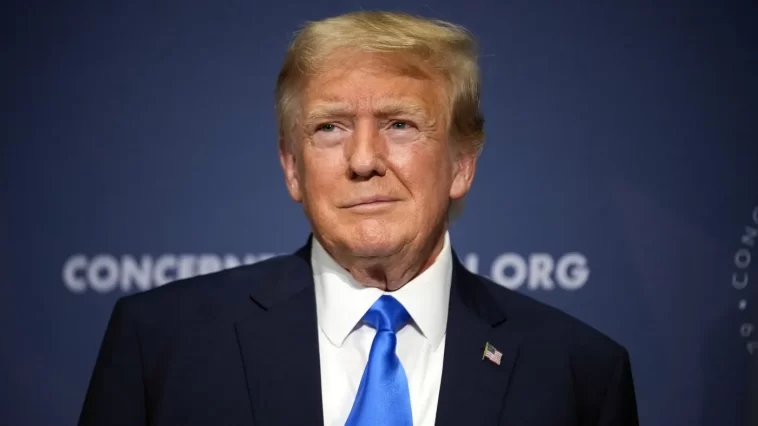LISTEN HERE:
In a recent development witnessed in Michigan, the state court of appeals has given its ruling on one of many ongoing cases relating to the potential candidacy of a past president in the upcoming 2024 ballot. The issue under scrutiny was an attempt to exclude this former president from the 2024 ballot—reasoning being his supposed involvement in the unsettling incident at the U.S. Capitol Building on January 6, 2021.
Critics argued this potentially made him unfit for candidacy as per the ‘insurrection’ clause of the 14th Amendment. Going against this, the Michigan court dismissed the challenge, affirming two prior lower court decisions.
The court’s ruling, a unanimous 3-0, came with the assertion that, under the Michigan state law, selections for primary ballot lie with the political parties and individual candidates themselves. Candidates’ eligibility for inclusion in the state’s presidential ballots is a matter beyond the court’s jurisdiction, the panel of three judges clarified.
It’s important to underline that no official charges of ‘insurrection’ have been filed against the ex-president nor has any conviction been made.
Historically, the 14th Amendment’s specific clause has only been evoked several times—most of which occured in the period following the Civil War. It is anticipated that one from the group of lawsuits challenging his inclusion will eventually be elevated to U.S. Supreme Court for judgment. Curiously, the Supreme Court has yet to pass any ruling on cases regarding the insurrection clause.
The Michigan court’s stance aligns with a similar ruling from the Minnesota Supreme Court, maintaining the past president’s spot in their state’s primary ballot.
This is based on the premise that as elections are essentially party-run contests, the decision of inclusion should remain with them. To date, there’s been only one court to conclude that the figure in question undeniably committed an act of insurrection, yet refrained from excluding him from the ballot.
It was District Judge Sarah B. Wallace who found the former leader culpable of inciting an insurrection. Yet, she noted that Section 3 of the 14th Amendment—laying out various roles off-limits to those guilty of insurrection—does not explicitly include the presidency, leading to her controversial refusal to disqualify him.
A careful note was made by Judge Wallace on her reluctance to back an interpretation that would exclude a presidential candidate without ‘a clear, unmistakable indication’ from Section 3 itself. After careful consideration of arguments from both sides, Judge Wallace stated, ‘the term ‘officers of the United States’ did not include the President of the United States’. This particular stance earned her critique, while the team representing the past president celebrated another victory.
Backers of the previous ruling echoed their praise in an email noting their appreciation of what they deemed a win in the state of Colorado. They consider this another definitive step towards dismissing the disapproval they consider un-American and against the people’s right to choose their candidate. Moreover, they encouraged rapid disposal of similar challenges.
The supporters highlighted a string of defeats for so-called unwarranted Democrat-led 14th Amendment challenges in Colorado, Michigan, Minnesota and New Hampshire. They expressed disdain for what they believe are blatant political attempts to sway the presidential election outcome by the desperation of a failing opposition.
They affirm the resilience of their candidate, insisting the American voter has a constitutional right to vote for their preferred candidate—with their leader winning by a vast majority.
Spokesperson Steven Cheung added his voice to the cheer, emphasizing the supremacy of the voter’s right. He heralds a hearty victory in Colorado that day and insists on the importance of dismissing all remaining opposition to their candidate’s presence on the ballot. He proclaimed their unwavering resolve for ‘total victory in 2024’ under their leader’s guidance.
In related proceedings, a state judge in Michigan signaled an agreement with Colorado’s past ruling. Claims Judge James Redford contested arguments linking the previous president’s alleged involvement in the January 6, 2021 incident with his disqualification for the presidential run. Redford, in his statement, emphasized that because the former president had obeyed state law while qualifying for the primary ballot, there was no ground to exclude him.
Judge Redford rounded off his position with the belief that the decision to include or exclude a candidate from future presidential ballots should rest primarily with Congress. Concurring with Judge Wallace, he also argued that the position of U.S. President does not fall within the ambit of ‘officers of the United States’ as per Section 3 of the 14th Amendment.
Predictably, these court rulings—whether of agreement or disagreement—have stirred up conversations, both in legal circles and amongst the general populace. As the nation moves towards the 2024 elections, the potential inclusion or exclusion of certain controversial figures remains a contentious issue. Consequently, greater public focus is being drawn to the interpretation and application of the 14th Amendment.
While various political and legal analysts continue to dig into this complex issue, rekindling debates over Constitutional law and the power dynamics of the U.S. political system, it becomes crucial for all stakeholders to consider these debates and perspectives. Regardless of the final outcome, this electoral run will indeed precipitate a historical precedent.



